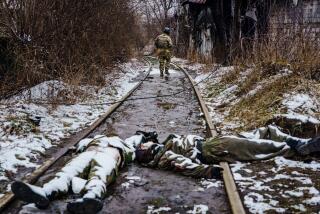Counter-terrorism official defends U.S. campaign of targeted killings
A senior Obama administration counter-terrorism official said Wednesday that the government’s campaign of targeted killings abroad “gives me pause,” but he added that it would be “wholly irresponsible” not to stop those plotting to harm Americans.
“A police officer doesn’t need a court order to defend himself if someone pulls out a gun,” Michael E. Leiter, who heads the National Counterterrorism Center, said during a national security conference session here. “The U.S. government has that same right of self-defense internationally.”
The U.S. has carried out at least 144 airstrikes in Pakistan under a covert CIA program using aerial drones, according to Long War Journal, a blog that counts the strikes using news media reports. Two such strikes were recorded Saturday.
Leiter spoke with uncharacteristic candor during his appearance about a program that U.S. officials have never officially acknowledged and that is drawing growing criticism around the world.
A report last month by Philip Alston, a United Nations’ special advisor, said the program violates international standards of accountability and should be taken away from the CIA.
U.S. officials have not acknowledged the existence of the CIA program, but they have defended U.S. counter-terrorism policies abroad as legal. During the Aspen Security Forum in Colorado, Leiter was asked whether he had any qualms about reports that Anwar Awlaki, a U.S. citizen and radical cleric, was added to the CIA’s hit list this year.
“It certainly gives me pause. I know it gives Leon pause,” Leiter said, referring to CIA Director Leon E. Panetta. “Anyone who is involved in life-and-death decisions, it gives them pause.”
However, Leiter said Awlaki played an operational role in the attempted bombing of an airliner Christmas Day over Detroit, and he had to be stopped.
Awlaki, 38, who was born in New Mexico, is believed to be living in Yemen. The majority of U.S. targeted killings are undertaken in Pakistan under the U.S. program.
Leiter referred to the drone program when he was questioned by Michael Isikoff, a writer for Newsweek who moderated the discussion. Isikoff asked what would be different about China launching a drone strike against Rebiya Kadeer, a Uighur political activist living in Virginia who is accused by China of inciting violence in that country.
Leiter replied that there are many differences, including the “relations that we have with the host government,” meaning Pakistan.
Pakistan typically does not publicly acknowledge its cooperation in the CIA drone program. Following Leiter, however, Husain Haqqani, Pakistan’s ambassador to the U.S., came very close to doing that during a lunchtime talk.
“Pakistan has never said that we do not like the elimination of terrorists through Predator drones,” he said, calling the technology “very, very useful.”
The U.S. is doing a better job consulting the Pakistani government, he said. When he was asked whether that meant intelligence-sharing on targets, he replied: “I’ll let you say that, please. Go ahead and complete that sentence on my behalf.”
Leiter’s comments came after Panetta appeared on ABC’s “This Week” on Sunday and defended the drone program against accusations that it violates international law.
In a 75-minute question-and-answer session, Leiter, who also served in the George W. Bush administration, said U.S. counter-terrorism strategy had not changed markedly between the two administrations.
More to Read
Start your day right
Sign up for Essential California for news, features and recommendations from the L.A. Times and beyond in your inbox six days a week.
You may occasionally receive promotional content from the Los Angeles Times.







